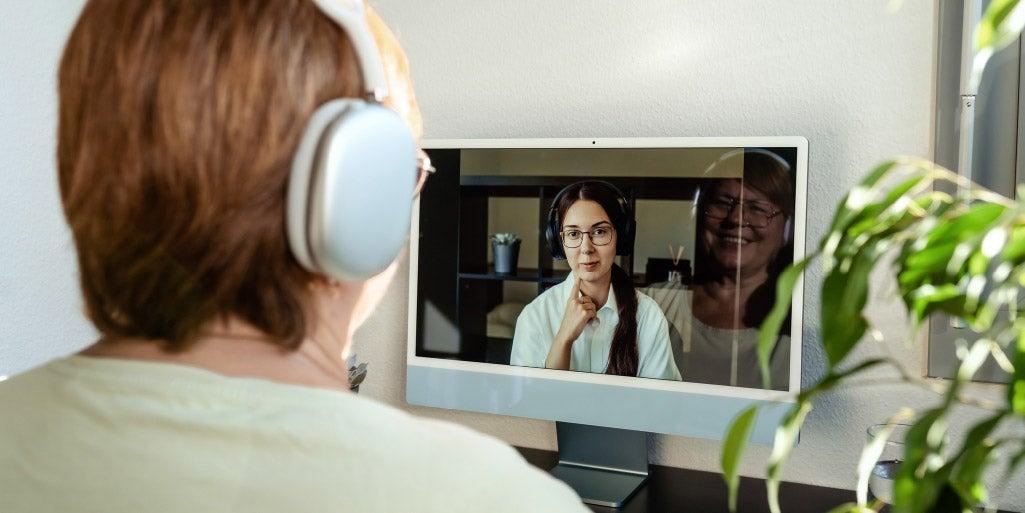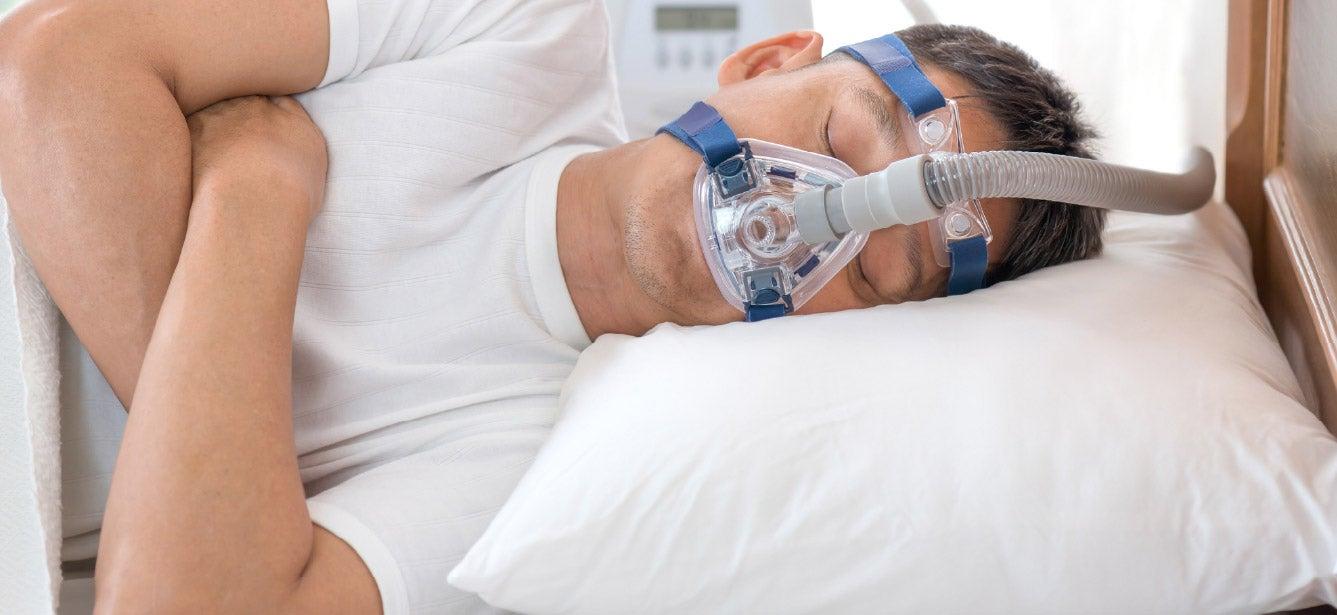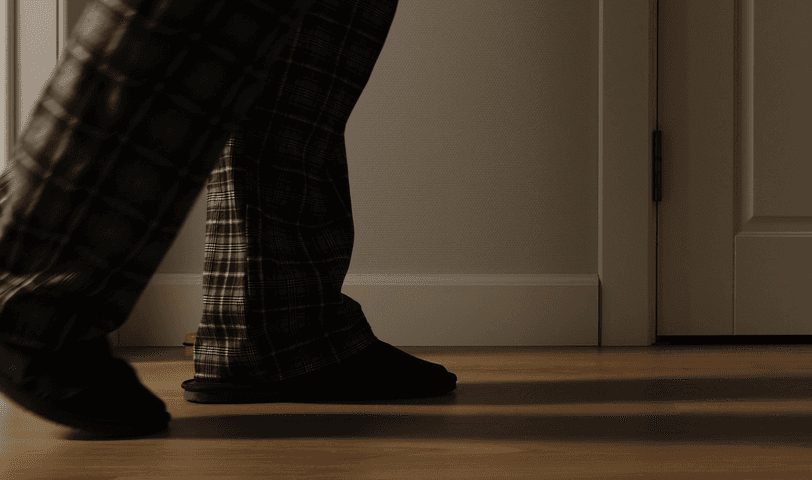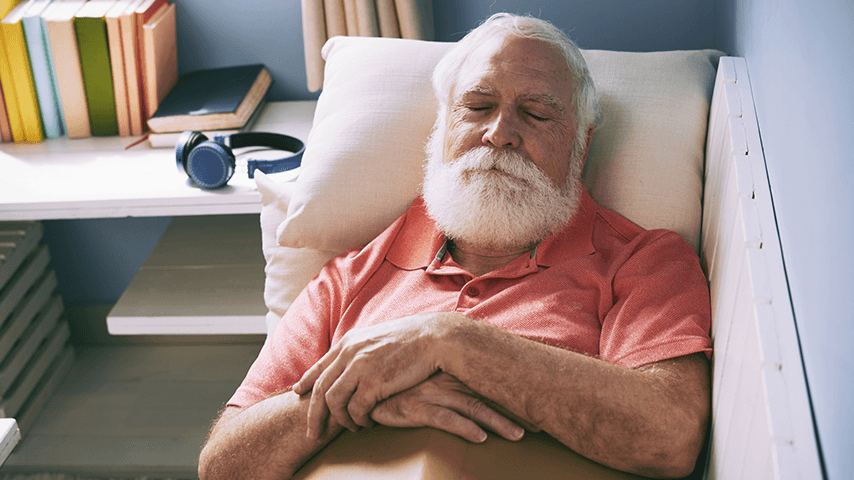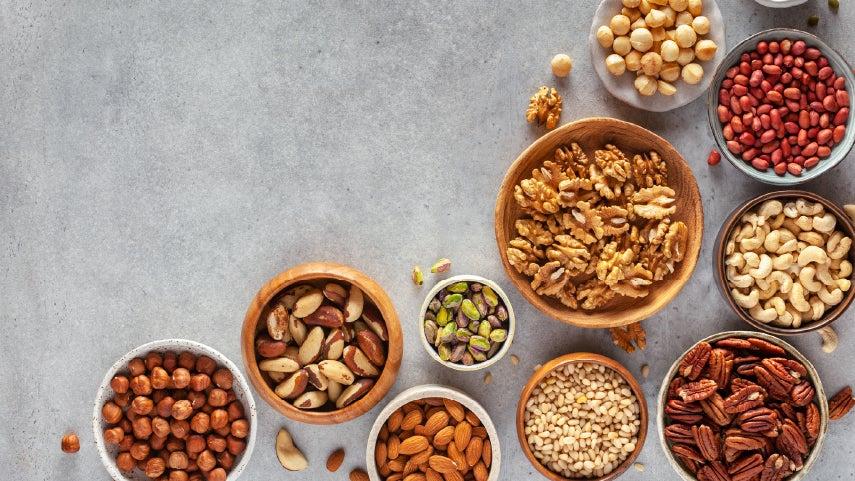
Related Topics
“Without enough sleep, we all become tall two-year-olds,” the author JoJo Jensen observed.
And—as any sleep-deprived adult can tell you—she’s right. Without adequate nighttime rest, we can become just as irritable and cranky as a toddler who’s missed her afternoon nap. Beyond that, occasional or frequent insomnia can wreak havoc on our focus and our mood. It also can lead to a higher risk for falls and certain health conditions such as obesity and heart disease.
Sleeping well, on the other hand, rejuvenates us. It supports our physical and mental health, helps us better regulate our emotions, and even boosts our memory.
That’s why we should aim for the recommended seven to nine hours of quality sleep each night.1
Still, as many as one in three adults in the U.S. falls short of this goal.2 Are you among them? Then you might be interested to learn about a natural sleep remedy that’s available over the counter. Actually, it’s available on the counter—or in your fridge, pantry, or local grocery store.
So, what is this natural sleep aid? It’s food.
How does food help you sleep?
First things first. There is no “magic bullet” diet for better sleep, said Gretchen Dueñas-Tanbonliong, NCOA Center for Health Aging Associate Director of Health and Wellness.
“If you have a disorder like sleep apnea, experience chronic pain, or live with depression, you likely will need to incorporate several complementary strategies for getting better sleep,” she advised. “These may include working with your health care provider, taking certain medications, and adopting healthy habits like getting more exercise and limiting your alcohol intake.”
That said, sleep researchers and registered dietitian nutritionists have discovered that certain foods can make a difference at bedtime. Some are packed with vitamins, minerals, and other nutrients known to induce sleep;3,4 others contain sleep-related hormones or their building blocks.5 These include (but aren’t limited to):
- Magnesium
Magnesium is a precursor, or building block, for melatonin—which is a key sleep-promoting hormone. Magnesium also may reduce levels of cortisol (a stress hormone); relax the muscles; and calm the nervous system.6 - Melatonin
Our bodies naturally produce melatonin, which signals our brains that it’s time to sleep. But certain things, like exposure to blue light, can interfere with this process; and reduced melatonin levels can disrupt our natural sleep cycle.7 - Serotonin
Serotonin is a chemical normally produced in our brain and our digestive system. On its own, serotonin plays a key role in how long and well we sleep; it’s also necessary for our bodies to produce melatonin.8 - Tryptophan
Many foods—especially those high in protein—include this amino acid, which our bodies convert into important molecules and chemicals that promote sleep, among other functions. These include both serotonin and melatonin.9
“When we eat foods containing these ingredients, we potentially can improve the quality and duration of our sleep,” Dueñas-Tanbonliong said. “As always, though, be sure to consult with your health care professional before adding something new to your diet.”
If you find yourself tossing and turning at night, give these eight research-backed, sleep-inducing foods a try.
What foods can I eat to help me sleep?
The best foods for sleep are ones that boost serotonin and melatonin levels. But you also have to enjoy eating them! Take a look at the list below and choose one or more that you know you like and expand your horizons from there.
✅ Cheese
Studies show a direct relationship between cheese and sleep. That’s because cheese contains both tryptophan and more: things like magnesium, zinc, and Vitamin B6, all of which help our bodies convert tryptophan into serotonin and melatonin.10
If you don’t have a dairy intolerance, eating a small evening snack of cheese might help lull you into la-la land. And—since healthy carbohydrates naturally boost the serotonin levels in our brains11— Dueñas-Tanbonliong advised pairing a few small cubes with some whole-grain crackers.
✅ Kiwi
This little green fruit packs a night-time punch—one that just might knock you out in a good way. In fact, adults who once struggled to fall asleep report that eating a few kiwis at night made a noticeable difference.12
Kiwis contain high levels of serotonin, so it makes sense that they make you drowsy. They also contain anti-inflammatory compounds, which also can help calm certain bodily processes and ease you into slumber. Kiwis make a light snack, too, so they’re ideal to try later in the evening.
✅ Nuts and seeds
Many nuts and seeds contain magnesium, melatonin, tryptophan, or all three. Some of the best choices include almonds, cashews, pistachios, walnuts, pumpkin seeds, and sesame seeds.
Unless you have an allergy to them, nuts, seeds, and nut butters make an ideal and easy addition to dinner salads, soups, and smoothies. They’re also a great source of healthy protein (see the section on turkey, below, for more info on that). For a light snack before bedtime, try adding a small handful of nuts to your cheese and crackers, or spread some almond butter onto a plain rice cake.
✅ Rice
Speaking of rice: white or brown, this carbohydrate boosts serotonin. Of the two, whole-grain (brown) rice is better—because it contains higher amounts of fibert, certain B vitamins, potassium, iron, magnesium, and tryptophan.13
That means brown rice not only is good for your sleep, it’s part of a healthy diet, too. Pair a few ounces of brown rice with your dinner to reap the benefits of both.
✅ Tart cherry
Also called “sour cherry,” tart cherry contains high levels of dietary melatonin and also has been shown to increase melatonin levels in the body.14 One clinical trial showed that adults age 50 and over with persistent insomnia slept better and for longer after drinking tart cherry juice.15
Two caveats here, Dueñas-Tanbonliong pointed out. First, read your labels. Tart cherry is—well—tart, so many juice brands add sugar. Look for brands with little to no added sugar, especially if you have diabetes. Second, avoid drinking anything too close to bedtime; nocturia—having to pee at night—most definitely will interrupt your sleep.
✅ Turkey
Plenty of studies have shown that turkey alone won’t conk you out; its value to sleep rests on the fact that it’s packed with tryptophan. “This isn’t a situation of piling a plate full of drumsticks before you turn in,” Dueñas-Tanbonliong said with a chuckle. “It’s a situation of helping your body better produce serotonin and melatonin over time.”
As a healthy lean protein, turkey makes a great choice for a balanced plate. According to official dietary recommendations, most adults should get around 1.0-1.2 grams of protein for every 2.2 pounds they weigh. So, if you weigh 150 pounds, you should aim to eat between 68-83 grams of protein each day. Ideally, you will spread this out over several meals. (One 3-ounce serving of lean white meat equals around 20 grams of protein). As with any heavier meal, try to avoid eating turkey within four hours of bedtime.
Other tips for improving your sleep
Of course, getting better sleep depends on more than diet alone. Practicing good “sleep hygiene” (nighttime habits that promote sleep) is important, as well as managing other lifestyle and health variables.
✅ Check the temperature in your bedroom
It can be hard to sleep when it’s too hot or too cold. If you’re constantly tossing off the covers—or piling extra blankets on your bed—adjusting the thermostat can be a good place to start.
✅ Make other improvements in your sleep environment
Blue light is bad for sleep. Put away your phone and tablet well before bedtime and create a calming environment in your bedroom: dim the lights; listen to soothing music; spray lavender on your pillow.
✅ Talk with your doctor
Many health conditions can cause insomnia—including chronic pain, sleep apnea, restless leg syndrome, and depression. Consult your provider if you struggle with poor sleep, excessive daytime sleepiness, or other troubling symptoms.
✅ Investigate high-quality bedding
Should you upgrade your mattress? If you snore, can’t find a comfortable sleeping position, or are a “hot sleeper,” finding the best mattress for you can make a difference.
If you’re in the market for one, be sure to check out our comprehensive reviews for the best mattress for back pain, the best mattress for neck pain, the best mattress for sciatica and more.
The bottom line
You may be surprised to learn that certain dietary choices can help combat insomnia. Scientists believe these sleep-inducing foods work because they contain essential vitamins, minerals, amino acids, and other compounds that support a healthy sleep cycle.
While there’s no official diet for better sleep, foods that contain magnesium, melatonin, serotonin, and tryptophan can naturally help you get better rest.
Try combining these foods with other good sleep practices, like limiting screen time and investing in the best mattress you can afford, to reap the many positive benefits to your physical and mental health.
Sources
1. National Institutes of Health. National Heart, Lung, and Blood Institute. How Much Sleep Is Enough? March 24, 2022. Found on the internet at https://www.nhlbi.nih.gov/health/sleep/how-much-sleep
2. National Institutes of Health. National Heart, Lung, and Blood Institute. What Are Sleep Deprivation and Deficiency? March 24, 2022. Found on the internet at https://www.nhlbi.nih.gov/health/sleep-deprivation
3. Chioma J. Ikonte, et al. Micronutrient Inadequacy in Short Sleep: Analysis of the NHANES, 2005-2016. Nutrients. Oct. 1, 2019. Found on the internet at https://pubmed.ncbi.nlm.nih.gov/31581561/
4. Gorika Djokic, et al. The Effects of Magnesium – Melatonin – Vit B Complex Supplementation in Treatment of Insomnia. Macedonian Journal of Medical Sciences. Sept. 30, 2019. Found on the internet at https://www.ncbi.nlm.nih.gov/pmc/articles/PMC6910806/
5. Jo Williams. How to increase serotonin. Good Food. Oct. 26, 2023. Found on the internet at https://www.bbcgoodfood.com/health/wellness/how-to-increase-serotonin
6. Caitlin Geng. Does magnesium help you sleep? Medical News Today. Aug. 1, 2023. Found on the internet at https://www.medicalnewstoday.com/articles/magnesium-for-sleep
7. Zawn Villines. Melatonin for sleep: What to know. Medical News Today. May 15, 2019. Found on the internet at https://www.medicalnewstoday.com/articles/325181#_noHeaderPrefixedContent
8. Cleveland Clinic. What is serotonin? Found on the internet at https://my.clevelandclinic.org/health/articles/22572-serotonin
9. Grant Tinsley, PhD, CSCS, *D, CISSN. How Tryptophan Boosts Your Sleep Quality and Mood. Healthline. July 25, 2023. Found on the internet at https://www.healthline.com/nutrition/tryptophan
10. Marie-Pierre St-Onge, et al. Exploring the Role of Dairy Products in Sleep Quality: From Population Studies to Mechanistic Evaluations. Advances in Nutrition. March 14, 2023. Found on the internet at https://www.ncbi.nlm.nih.gov/pmc/articles/PMC10229376/
11. Elizabeth A. Thompson. Carbohydrates are essential for effective dieting and good mood, Wurtman says. MIT News. Feb. 20, 2004. Found on the internet at https://news.mit.edu/2004/carbs
12. Hsiao-Han Lin, et al. Effect of kiwifruit consumption on sleep quality in adults with sleep problems. Asia Pacific Journal Of Clinical Nutrition. 2011. Found on the internet at https://pubmed.ncbi.nlm.nih.gov/21669584/
13. Len Canter. Cooking with whole grains. Medical Xpress. Feb. 28, 2019. Found on the internet at https://medicalxpress.com/news/2019-02-cooking-grains.html
14. Glyn Howaston, et all. Effect of tart cherry juice (Prunus cerasus) on melatonin levels and enhanced sleep quality. European Journal of Nutrition. December 2012. Found on the internet at https://pubmed.ncbi.nlm.nih.gov/22038497/
15. Jack N. Losso, et al. Pilot Study of the Tart Cherry Juice for the Treatment of Insomnia and Investigation of Mechanisms. American Journal of Therapuetics. March/April 2018. Found on the internet at https://pubmed.ncbi.nlm.nih.gov/28901958/
